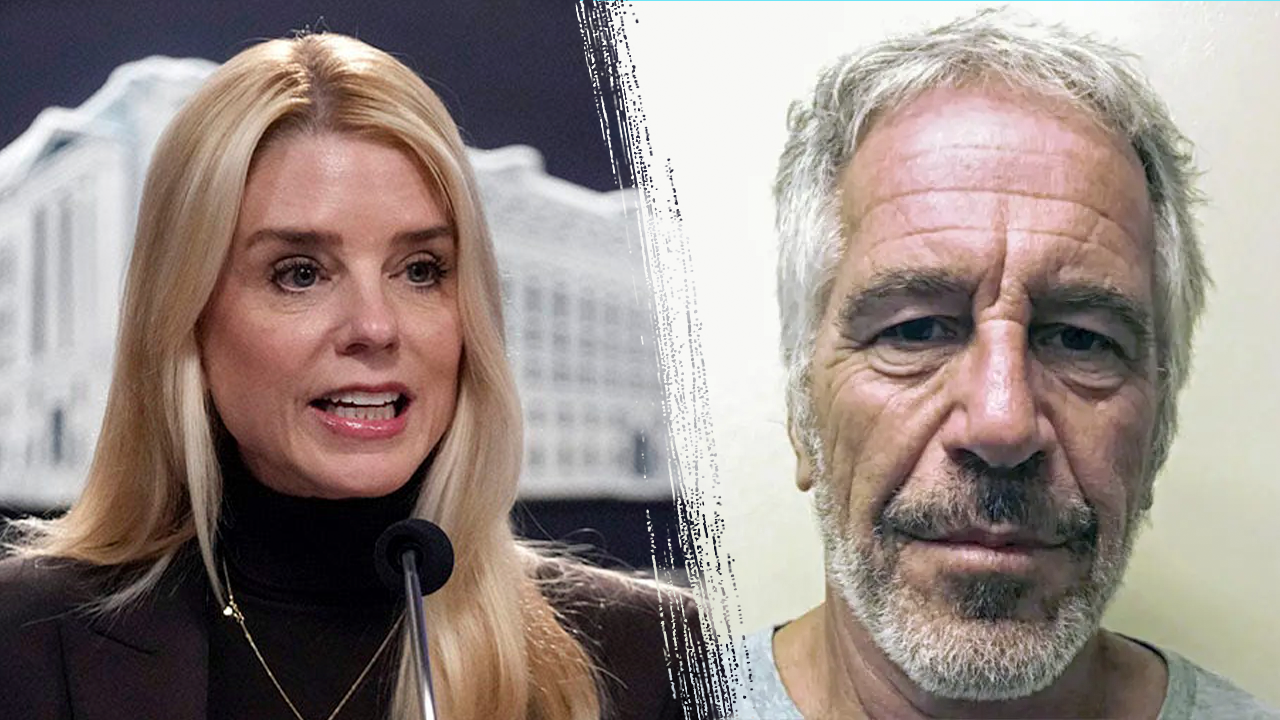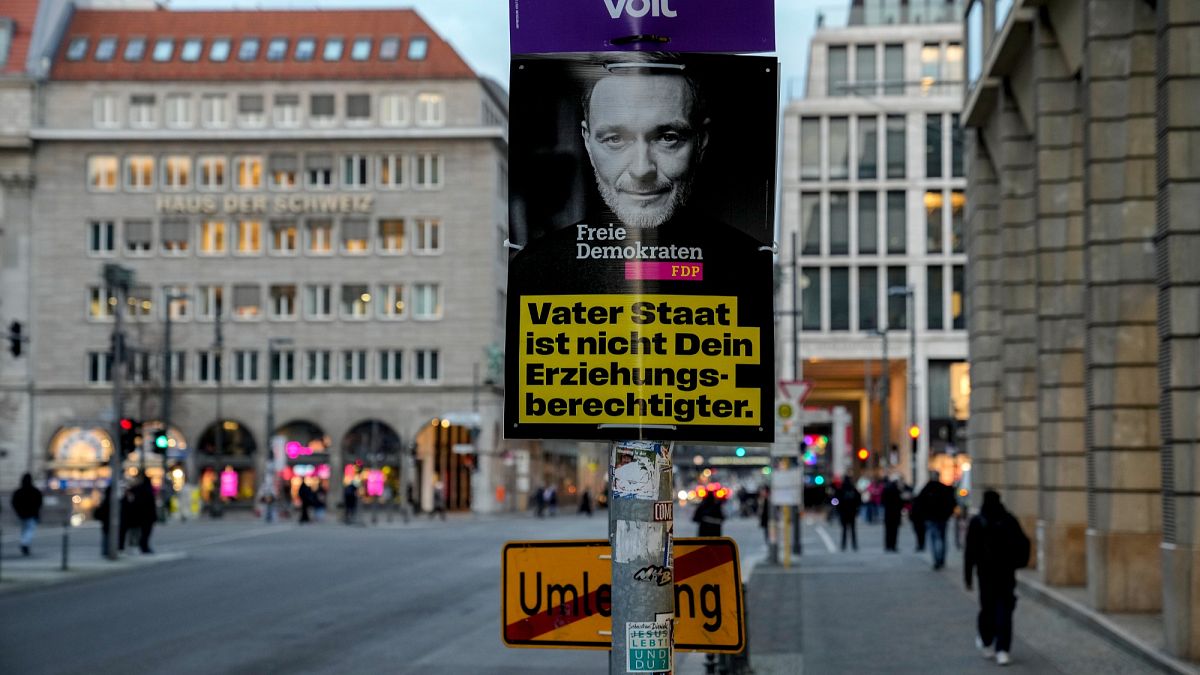For three German parties, their existence and participation in the Bundestag is riding on Sunday’s elections. Euronews spoke with Die Linke, Sahra Wagenknecht Alliance and Free Democrats.
In Germany, for a party to gain seats in the Bundestag, it has to win more than 5% of total votes or at least three direct mandates in individual constituencies.
For parties such as liberal Free Democrats (FDP), far-left Die Linke or The Left and leftist-conservative Sahra Wagenknecht Alliance (BSW) — all of who have hovered around 5% during the election campaign — Sunday could spell the end of relevance.
The FDP, which formed one part of the now-failed unpopular ruling coalition three-way, has scored between 4 and 5% in the polls.
For The Left, a party that has suffered a drop in popularity in recent times, a record number of 91,000 people applied to become new members over the past couple of weeks, with polls putting them between 6 and 9%.
The BSW, which received 6.2% of votes in the European election in June — impressive for a party only founded that year — has found its popularity declining during its national campaign.
Euronews spoke with deputy chairman of the FDP parliamentary group Christoph Meyer, Oliver Ruhnert, BSW’s top candidate in Berlin, and co-leader of The Left Ines Schwerdtner to find out how smaller parties are feeling and planning in the run-up to the vote.
Euronews: What is your party’s main goal if it reaches or exceeds the 5% threshold?
Christoph Meyer (FDP): We are very optimistic that we will achieve that. But the most important thing is the economic situation in the country. We need to push for structural reforms that we were unable to implement in the previous government. The country has lost competitiveness over the past 15 years, and that needs to be addressed now.
Ines Schwerdtner (The Left): We have just adopted a 100-day programme. It states that we will continue exactly what we have been doing during the election campaign. We will keep going to 100,000 households, asking people what concerns them most and what is important to them.
In parliament, we will immediately launch a rent summit and introduce proposals for a rent cap. We have been advocating for this throughout the entire election campaign. We want to show people that, whether in government or not, we want to bring change, and we will start working in parliament right away.
Oliver Ruhnert (BSW): The main goal is to ensure in the German Bundestag and in the German parliament that there is a party that differs in many aspects from the current parties.
That means the BSW clearly focuses on diplomacy in various matters, says no to arms deliveries, and is a consistent peace party. And I believe that is something that currently does not exist in the Bundestag. And domestically, there are massive inequalities in Germany that have grown even larger in recent years due to the economic crisis.
The gap between rich and poor has widened. We have the problem of too little housing in cities. We also have, logically, the issue of pensions being too low for the elderly. And we have a minimum wage in Germany that is far too low, meaning that work is no longer enough — or for many, no longer enough — to get by and support their families. And to feed their families.
Euronews: Is your party interested in being part of a coalition, and if yes, under what conditions and with whom?
Meyer (FDP): Well, one runs in elections to be able to shape policy. That’s why we must indeed try to take on governmental responsibility. In our opinion, the best way to achieve our goals — both in economic policy and migration policy — is in cooperation with the CDU.
Schwerdtner (The Left): First, we will wait for the results on Sunday, and we are happy if we make it into parliament — we are very confident about that.
Our main focus is really implementing the demands of the people: capping rents and lowering everyday costs. As I said, that is what we are committed to, and we are not thinking about coalitions at this point.
If a coalition with them is not possible, then a so-called “Germany coalition” with the SPD as a third partner would be desirable. We have ruled out forming a coalition with the Greens or the AfD.
Ruhnert (BSW): Well, at least we are different from other parties, and we do not say from the outset that we would not take on government responsibility. That means if it were to happen — which I don’t think is the case this time — but if, in theory, the necessity arose, the BSW would not refuse, provided that key parameters align.
With us, there would be no continuation of current foreign policy, continuous armament, or ever-increasing spending on weapons.
Because, from our perspective, we need a different way of thinking. We need to get back to discussing disarmament. We need to mobilise all resources to re-establish peace, especially in Europe. And that is something that would not be negotiable for us.
Euronews: What happens if your party fails to clear the 5% threshold?
Meyer (FDP): That won’t happen. We will not fail to clear the 5% hurdle. The mood is good. Current polls show that the trend is stabilising, so we expect to have a good election night.
Schwerdtner (The Left): The great thing about our programme is that we will continue doing what we have done in the past weeks: helping people directly with their heating costs.
We offer a heating cost check, where people can have their heating bill reviewed for free and without obligation through Die Linke. We will continue doing this, whether we are in parliament or not.
The same applies to our rent gouging app, which allows people to check if they are being overcharged for rent. The good thing is that in parliament, we can put pressure on the government, but we can also do that from the streets. So, we are not afraid of this election, we simply look forward to a good result.
Ruhnert (BSW): The BSW is a very young party — it has only existed for about a year, and we have been quite successful so far. And in Germany, it would be historic to enter the Bundestag on the first attempt — that has never happened before.
And if it doesn’t work out now, it would indeed be very unfortunate and not something we could simply cope with.
There is a saying in German that you can’t just gloss over things. Because to build up the party’s structure and continue being successful, it would certainly be helpful to be in the Bundestag.
Euronews: What are the three key reasons for voting for your party?
Meyer (FDP): The most important thing is that the country makes progress in terms of economic prosperity. Only the FDP guarantees that all the issues that have been neglected in recent years will be addressed.
Schwerdtner (The Left): If you want socially aware opposition and a voice for justice and peace, you must vote for Die Linke.
We want to implement a migration policy shift to restore order to migration. And a vote for the FDP guarantees that the Greens will not be in the next federal government.
Ruhnert (BSW): The most important domestic policy reason is that we can and will achieve real improvements for the people. That means we need tax justice, and we will establish that. That is crucial for us.
Secondly, we will certainly ensure that people’s high energy costs, which are consuming their income, will no longer burden them to the same extent or will be offset. And we also stand for better education, better roads, and an overall improved infrastructure, including railway and public transport. I believe that is something that concerns many people.
And the third reason, of course, is foreign policy, which I already mentioned. Many people in Germany fear war, fear escalation. In the Bundestag, we would ensure that such an escalation does not happen.
And the last point, domestically, is that we need to create a sense of unity in Germany again rather than division. And to achieve that, it is essential that people feel their concerns and problems are being taken seriously — whether on the topics of migration, wages, the growing gap between rich and poor, or fears of global conflicts.
Euronews: Any last points to add?
Meyer (FDP): No.
Schwerdtner (The Left): Yes, actually. We are excited about a record number of members, now over 91,000. In the past weeks, tens of thousands have joined us, partly because we take a clear stand: we are the firewall, the only party that firmly stands against the far right.
That has motivated many people to get involved with us, which is, of course, a great gift. It gives us a lot of momentum, not just for the election but also beyond, allowing us to build a party that is deeply rooted in society, useful, friendly, and where people feel they can get involved.
Ruhnert (BSW): I think what’s important is that many parties are once again using the same slogans as before. And we don’t want to continue with the status quo because we believe that the strength of the AfD in Germany is a big problem.
We believe that it has only become so strong because nothing has changed in recent years — just more of the same. If we don’t make changes soon, the situation will become even more difficult. And BSW pursues pragmatic politics. Unlike The Left party, which promises everything but achieves nothing, we work on practical, rule-based solutions that actually help people. That’s what makes us different from other parties.
The AfD benefits from dissatisfied people, and that is the big issue. If you don’t start addressing key problems — migration, for instance — they will continue to push their narrative. That is a big problem.
And that’s the only point where we may seem similar (to the AfD). We say irregular migration must be stopped because it does not align with the law. If we don’t address this issue, then in four years, the AfD will be at 30%. And that is a crucial matter.



